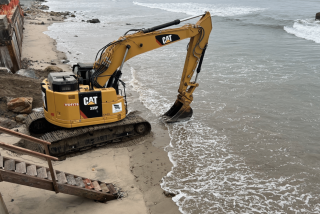Free to Sit on the Sand
- Share via
In white capri pants and overblouse and her long gray braid, Sara Wan looks more grandmother than rebel. But the 64-year-old Malibu resident and California Coastal commissioner is rightly fed up with the vigilante war her wealthy neighbors wage against sunbathers, boogie boarders and body surfers at Broad Beach. Wan plopped herself and her cooler on the sand Sunday to illustrate how private guards and sheriff’s deputies bully beachgoers off sand that belongs to all Californians.
For years, her commission cajoled, pleaded, even sued to force homeowners to call off the private cops, pull out “No Trespassing” signs dotting the sand and unchain stairways and gates so people could pass between the mansions. But the harried commission staffers have been no match for the Malibu elite’s hired lawyers and beach bouncers.
Broad Beach is an extreme example of how homeowners have run roughshod over the public. California law guarantees public use of the beach seaward of the mean high tide line. Besides this damp sand, 40% of the 108 houses on Broad Beach include a public easement; some easements are just a 25-foot-wide strip of dry sand, and others extend all the way to the homes. The result is a confusing patchwork of public and private spaces that homeowners have exploited.
As soon as Wan sat down, a hired guard raced over on his all-terrain vehicle, ordering her to move. When Wan refused, he summoned five sheriff’s deputies. Instead of slinking off like most beachgoers, Wan produced documents proving that, despite the “No Trespassing” signs, she was sitting on an easement the homeowner granted the public 22 years ago in exchange for the commission’s permission to remodel.
Families shouldn’t have to pack a parcel map with the sunscreen and sandwiches. And they shouldn’t have to answer to deputies before they spread towels on a beach.
Waterfront residents say they don’t want teenagers tossing bottles on the sand or preschoolers using their lawns as a toilet. Legitimate concerns, but homeowners could set out trash cans and install signs directing beachgoers to public restrooms at nearby Zuma Beach for a fraction of the $3,000 to $5,000 they each pay yearly for ATV rent-a-cops.
The deputies who confronted Wan should recall that their job is to defend the rights of beachgoers as vigilantly as those of homeowners. If they’re confused about the law, Sheriff Lee Baca should get them training. The misleading signs in the sand must come out; new markers should tell body surfers and picnickers where they can sit as well as where they can’t. And thank goodness Wan’s around to show what’s right.
More to Read
Sign up for Essential California
The most important California stories and recommendations in your inbox every morning.
You may occasionally receive promotional content from the Los Angeles Times.













